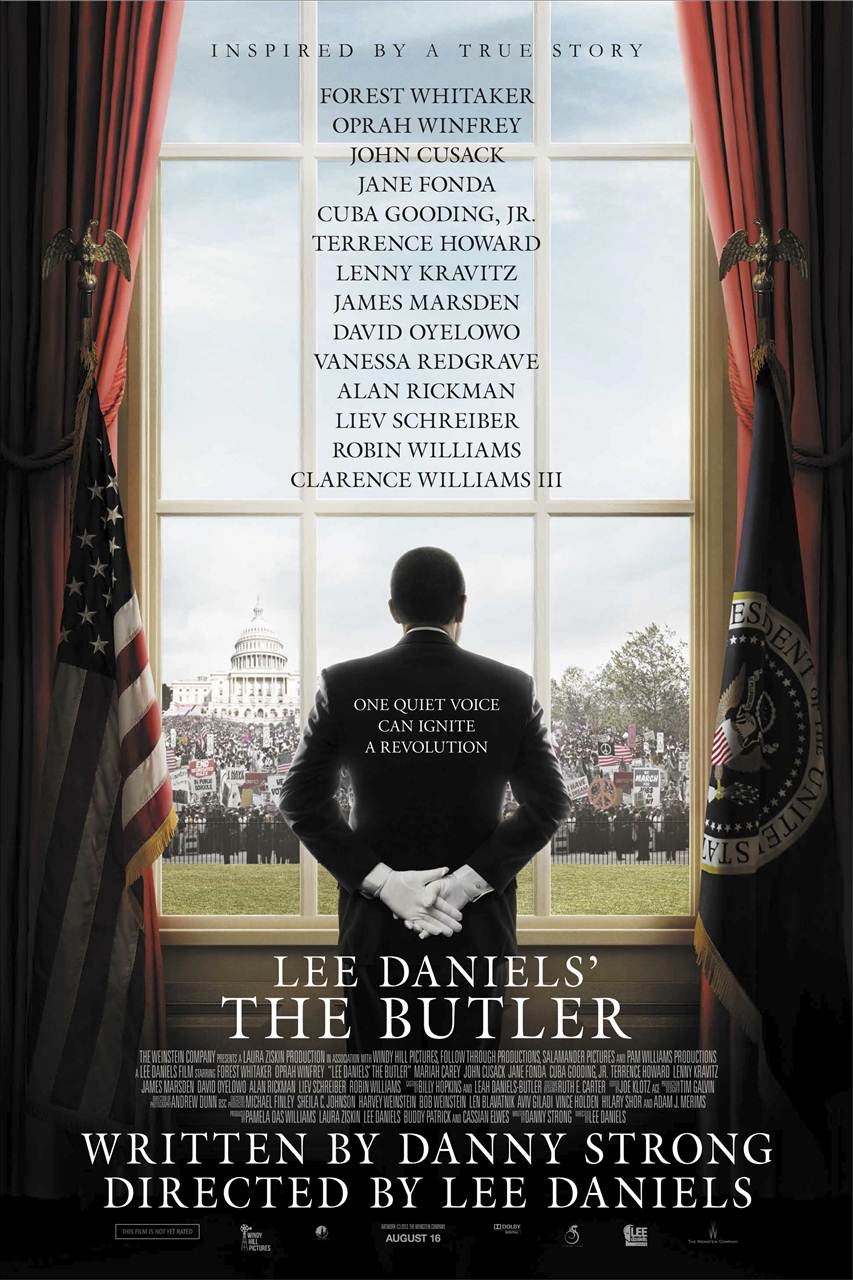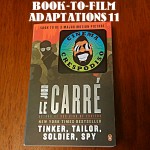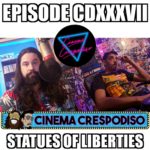Using this Washington Post profile of real life White House butler Eugene Allen as a way to tell the story of the United States civil rights movement, “Lee Daniels’ The Butler” tells this bold story in bold strokes, but also manages to squeeze in a much more intimate look at the personal cost of said movement on the lives of the families it effected directly. This movie is both dramatic and melodramatic, in your face and reserved, both unbelievable and all too real, and at the very least the most interesting and worthwhile movie playing in theaters right now.
The Butler in this movie is a made up butler (though many of the coolest and notable things that happen to the fake butler in this movie happened to the Mr. Allen for realsies), and we start with him as a kid living and working with his family on a plantation in the 1920s, but if you didn’t know any better, you would have thought this was a plantation in the 1820s, and after this kid endures his mother being raped and his father being murdered, he gets taken into the house by the old racist lady who lives there and is taught how to serve, which he seems to excel at for some reason, like some really shitty superpower.
So this kid obviously in case you’re stupid grows up to be this butler, his name is Cecil Gaines, and he’s played by the awesome Forest Whitaker, who is very busy in this movie just being all sorts of awesome. And Cecil Gaines has not only the good fortune of being one of the few butlers to work in the White House for several decades, but he also happens to serve many of different presidents their teas and coffees during very critical times of the civil rights movement and each presidency, like when he happens to hear Ike Eisenhower (Robin Williams) try to figure out how to racially integrate southern schools without instigating a civil war, or how he served LBJ (Liev Schreiber) while he sat on the toilet and worked on passing the Civil Rights voting act which was just repealed recently (PAY ATTENTION, AMERICA!). So when we follow Cecil Gaines, we also get to follow the whole civil rights movement through his silent and observing gaze, and this is where it is important to remember that while inspired by many true events, this is something of a fictional story, which means we can overlook the fact that this particular butler was around for every major presidential decision regarding race relations in America for over thirty years.
Now if the movie was ONLY this butler hanging out in the White House and observing US Presidents debating civil rights issues, this would actually be pretty lame. But this movie has something else up its sleeve, and that’s a dual reflection of the civil rights movements not only through the eyes of an employee of the White House, but also through the prism of domestic family life in America during this time period. This is done by showing Cecil Gaines coming home to his wife Gloria (Oprah Winfrey) and his two sons, most importantly his oldest son Louis (David Oyelowo), who takes a different approach to life in America than his father – instead of subservience and putting on a brave face while staring at the gaping maw of racism, Louis takes a much more active role in the civil rights movement, meeting with people and hitting the front lines of the movement by joining the protests at the segregated lunch counters and marching and doing all those other non-violent displays of protest. And much like his father Cecil, we the audience are treated to the evolution of this movement from non-violent protests all the way to the much more militarized Black Panther Party through Louis’ involvement, which somehow miraculously has him at the epicenter of some of the biggest moments throughout the history of the civil rights movement, from the massacre at Selma to the assassinations of both Martin Luther King Jr. and Malcolm X and beyond.
Cecil, coming from a cotton farm and working his way up to his current status, feels he knows what is best for his family, and Louis’ increasingly dangerous actions cause them to become more and more at odds with each other, which makes it so hard on this family because both Cecil and Louis want the same things but want to go about achieving these things in ways that seem diametrically opposed to each other. This tears the family apart, and it’s easy to see both sides of the argument, especially when you boil it down to the simplest truth – a father wants his son to stay safe, yet his son’s altruistic goals will put him in the direct path of danger. Cecil didn’t work so hard to raise his family in a relatively safer part of the country and to send his son to college just for that son to turn around and say “screw school, I’m gonna go fight racism with my defiance and with my face, which I will use to block punches and kicks.” And on the flip side, Louis is a strong and intelligent individual who found others like him, ready to band together to try to change the way the world operates, facing incredibly frightening possible consequences but still prepared to face those consequences so that their OWN kids will have an even better future.
By following both Louis and Cecil during the same time periods, we get to see the two different roles of the black American during this civil rights movement, personified by both of these people. Louis takes a very active approach to try to change the soul of this country, while Cecil continues with the tradition of the domestic helper, which Martin Luther King Jr. himself explains is a role that is actually subversive through subservience, as black butlers and maids and so on help to break down racial barriers by filling positions of trust and proving themselves to be hardworking and trustworthy, and we see this a little with the Presidents and their reactions to Cecil and his role within the White House, like when JFK (James Marsden) literally tells Cecil that knowing him and knowing about his freedom fighting son Louis changed his heart and the heart of his brother Bobby Kennedy.
So of course cut to JFK’s assassination. Because in a movie just over two hours and covering seven presidencies and over 70 years worth of civil rights history in the US, there is unfortunately no room for subtlety. With a heavy hand, this movie comes at you like a sledgehammer. People hoping for another sanitized, easily quaffable movie about race in America like “The Help” will be quickly disappointed as we are treated early on to an image of two dead black men hanging by their necks in lynches, with an American flag in the background. This is followed shortly by the aforementioned rape and murder of our hero’s mother and father, respectively, and it is a little while before we the audience are given something to smile at or laugh about (though the lighter stuff does indeed fill in the gaps for the rest of the film, as the movie even goes out on a pretty solid laugh, though of course only after heaping on even more heartache).
There’s even more than all of that going on in this movie, too, another possible reason for the bold strokes and heavy handedness, because they were trying to fit quite a lot into this thing. There’s Cecil’s relationship with his wife and how it deteriorates over the years due to this devotion to his job and then gets rebuilt over time, and then there’s Cecil’s relationship with his coworkers, and some of the inner workings and day to day life of the employees of the White House. There’s a woman-chasing neighbor of theirs played by Terrence Howard, and Louis has his own love interest that starts pretty hot and then gets pretty bad. And of course there is the parade of actors playing different presidents, with Schreiber’s LBJ being a standout and Jane Fonda as Nancy Reagan being the most deliciously ironic bit of casting because of, well, you know.
Anyway, this is a pretty good movie, definitely impressive in its scope and ambition, and definitely a movie that should be seen by the younger generations of this country who need to know where we’ve come from so we can all know where we are going.


 Book-to-film adaptations: 11 – ‘Tinker Tailor Soldier Spy’
Book-to-film adaptations: 11 – ‘Tinker Tailor Soldier Spy’ #505 – Failing Upwards
#505 – Failing Upwards #437 – Statues of Liberties
#437 – Statues of Liberties #104 – Happy Drew Year
#104 – Happy Drew Year
Leave a Reply
You must be logged in to post a comment.